Seely F.B. Analytical Mechanics for Engineers
Подождите немного. Документ загружается.

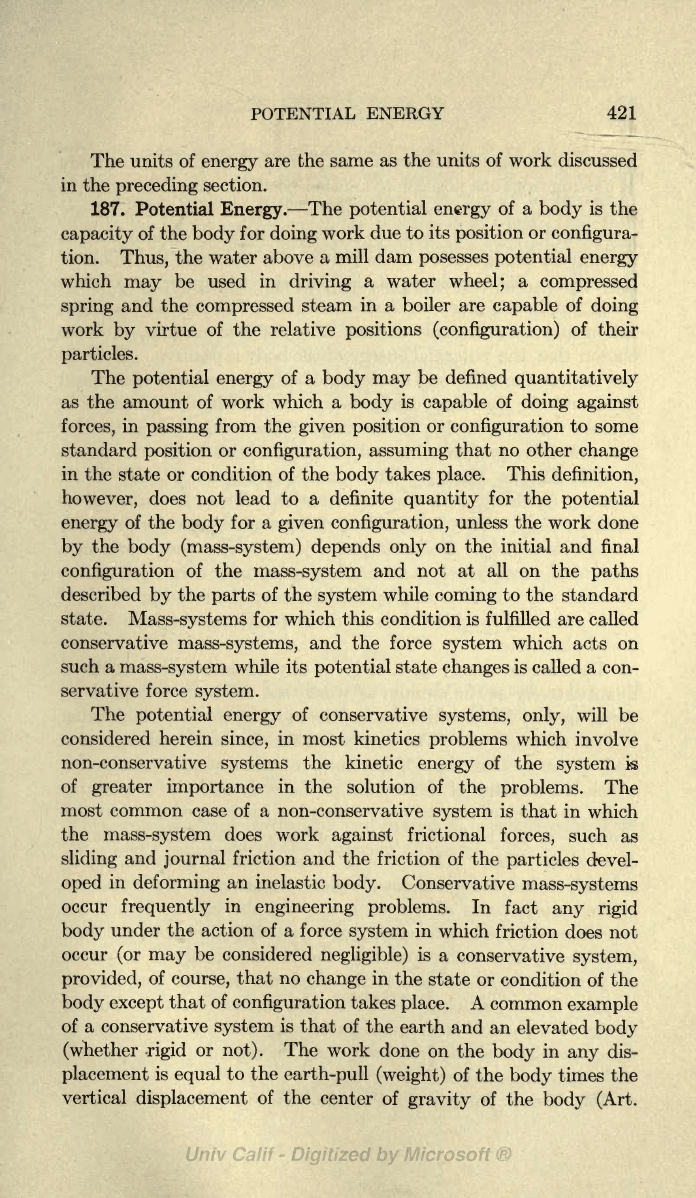
POTENTIAL
ENERGY 421
The units
of
energy
are
the same
as the units
of
work
discussed
in
the
preceding
section.
187. Potential
Energy.
The
potential
energy
of
a
body
is
the
capacity
of the
body
for
doing
work
due
to
its
position
or
configura-
tion.
Thus,
the water
above
a mill dam
posesses potential
energy
which
may
be
used
in
driving
a
water
wheel;
a
compressed
spring
and
the
compressed
steam
in
a
boiler
are
capable
of
doing
work
by
virtue of the
relative
positions
(configuration)
of their
particles.
The
potential energy
of a
body
may
be defined
quantitatively
as
the amount of work which
a
body
is
capable
of
doing against
forces,
in
passing
from the
given position
or
configuration
to some
standard
position
or
configuration,
assuming
that no
other
change
in
the
state or condition of the
body
takes
place.
This
definition,
however,
does
not
lead to a definite
quantity
for
the
potential
energy
of
the
body
for a
given
configuration,
unless
the work done
by
the
body (mass-system) depends only
on the initial and final
configuration
of
the
mass-system
and not at all on
the
paths
described
by
the
parts
of
the
system
while
coming
to the
standard
state.
Mass-systems
for
which
this condition is
fulfilled are called
conservative
mass-systems,
and the
force
system
which acts on
such a
mass-system
while its
potential
state
changes
is
called a con-
servative
force
system.
The
potential
energy
of conservative
systems,
only,
will
be
considered herein
since,
in
most kinetics
problems
which
involve
non-conservative
systems
the
kinetic
energy
of the
system
is
of
greater importance
in
the solution
of
the
problems.
The
most
common
case of a
non-conservative
system
is
that in
which
the
mass-system
does
work
against
frictional
forces,
such
as
sliding
and
journal
friction
and the friction
of
the
particles
devel-
oped
in
deforming
an
inelastic
body.
Conservative
mass-systems
occur
frequently
in
engineering problems.
In
fact
any
rigid
body
under
the
action
of a
force
system
in
which
friction
does not
occur
(or may
be
considered
negligible)
is
a
conservative
system,
provided,
of
course,
that no
change
in
the
state or
condition of the
body
except
that
of
configuration
takes
place.
A
common
example
of a conservative
system
is that of
the
earth
and an
elevated
body
(whether
rigid
or
not).
The work
done
on
the
body
in
any
dis-
placement
is
equal
to the
earth-pull
(weight)
of
the
body
times the
vertical
displacement
of
the
center of
gravity
of
the
body
(Art.
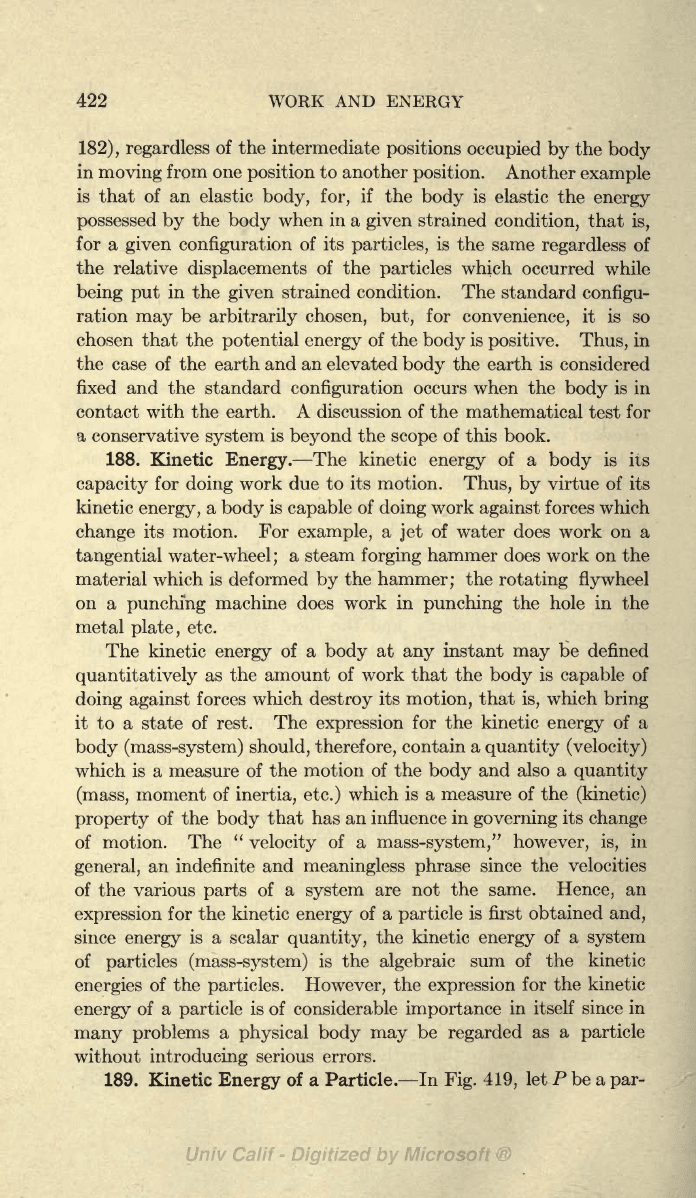
422
WORK AND ENERGY
182),
regardless
of
the intermediate
positions
occupied
by
the
body
in
moving
from one
position
to
another
position.
Another
example
is that
of an elastic
body,
for,
if
the
body
is
elastic
the
energy
possessed by
the
body
when
in
a
given
strained
condition,
that
is,
for a
given configuration
of
its
particles,
is the
same
regardless
of
the
relative
displacements
of the
particles
which
occurred while
being
put
in
the
given
strained condition. The
standard
configu-
ration
may
be
arbitrarily
chosen,
but,
for
convenience,
it
is
so
chosen that
the
potential
energy
of the
body
is
positive. Thus,
in
the
case of the earth
and an elevated
body
the earth
is
considered
fixed and
the standard
configuration
occurs
when the
body
is in
contact with
the earth. A discussion of the
mathematical
test
for
a
conservative
system
is
beyond
the
scope
of this book.
188.
Kinetic
Energy.
The kinetic
energy
of a
body
is its
capacity
for
doing
work due
to its motion.
Thus, by
virtue of
its
kinetic
energy,
a
body
is
capable
of
doing
work
against
forces which
change
its motion.
For
example,
a
jet
of
water does work
on a
tangential water-wheel;
a
steam
forging
hammer
does work
on the
material which is deformed
by
the
hammer;
the
rotating flywheel
on
a
punching
machine
does work
in
punching
the hole in the
metal
plate,
etc.
The kinetic
energy
of a
body
at
any
instant
may
tie defined
quantitatively
as the
amount of work that the
body
is
capable
of
doing against
forces which
destroy
its
motion,
that
is,
which
bring
it to a
state
of rest.
The
expression
for the
kinetic
energy
of a
body
(mass-system)
should, therefore,
contain a
quantity
(velocity)
which is a measure of
the motion
of the
body
and also a
quantity
(mass,
moment
of
inertia,
etc.)
which is
a
measure
of the
(kinetic)
property
of the
body
that has an
influence
in
governing
its
change
of motion. The
"
velocity
of a
mass-system,"
however, is,
in
general,
an
indefinite and
meaningless
phrase
since
the
velocities
of
the various
parts
of
a
system
are
not
the
same.
Hence,
an
expression
for
the kinetic
energy
of a
particle
is first obtained
and,
since
energy
is a scalar
quantity,
the
kinetic
energy
of
a
system
of
particles
(mass-system)
is the
algebraic
sum
of
the
kinetic
energies
of the
particles. However,
the
expression
for the
kinetic
energy
of
a
particle
is
of considerable
importance
in itself
since in
many problems
a
physical body may
be
regarded
as
a
particle
without
introducing
serious errors.
189. Kinetic
Energy
of a
Particle.
In
Fig.
419,
let
P be a
par-
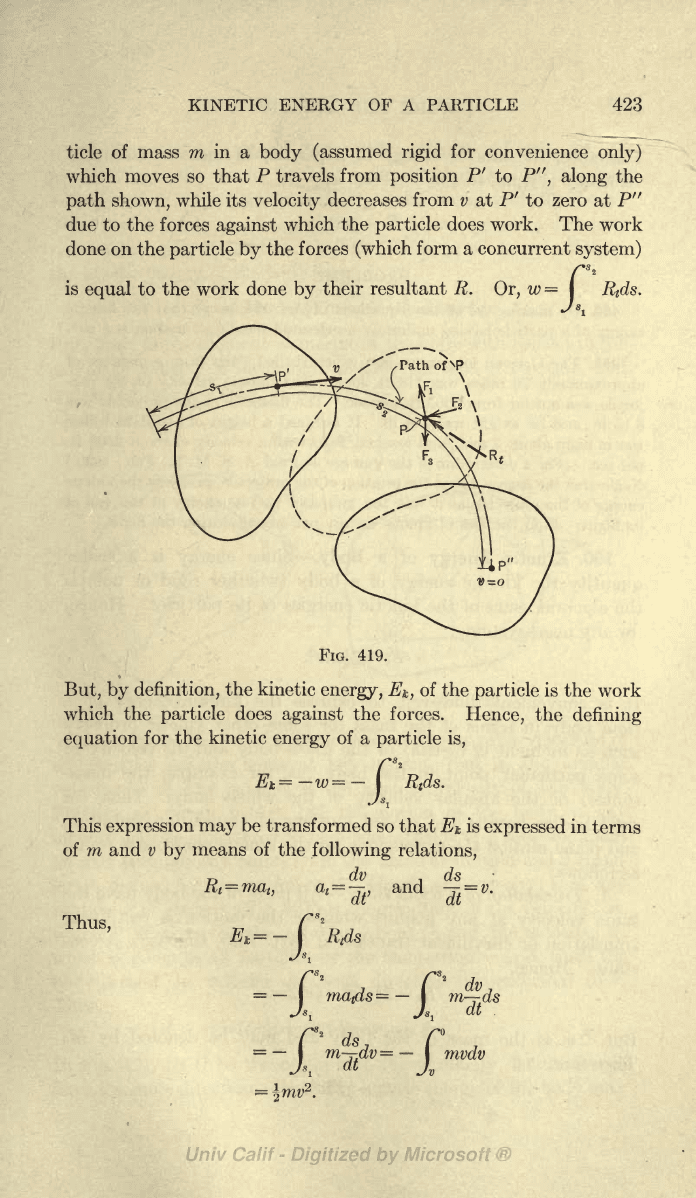
KINETIC
ENERGY OF A PARTICLE
423
ticle of mass
m
in
a
body
(assumed
rigid
for
convenience
only)
which
moves so that
P
travels
from
position
P
r
to
P"
', along
the
path
shown,
while
its
velocity
decreases
from v
at
P'
to zero at
P"
due to
the
forces
against
which
the
particle
does work. The
work
done on
the
particle by
the
forces
(which
form
a
concurrent
system)
is
equal
to
the work
done
by
their resultant R.
Or,
w
=
I
R
t
ds.
FIG.
419.
But,
by
definition,
the kinetic
energy,
E
k
,
of
the
particle
is
the
work
which the
particle
does
against
the forces.
Hence,
the
defining
equation
for the kinetic
energy
of a
particle is,
Ei=-w=-
I
R
t
ds.
This
expression
may
be
transformed
so
that
E*
is
expressed
in
terms
of
m and v
by
means of
the
following
relations,
Thus,
R
t
=
ma
t)
E
k
=-
dv
ds
a
<=
and v-
=
I
ma4s=
I
m-^ds
r ds,
r
m-j-av=
I
mvdv
J*
t
at
Jv
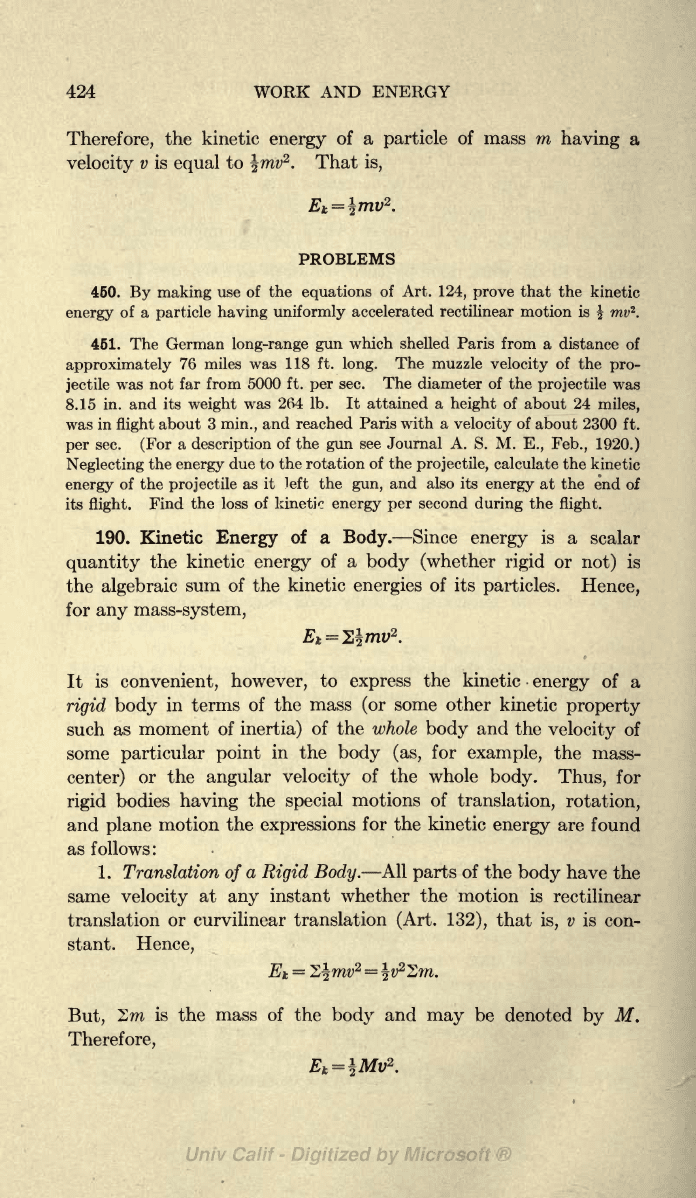
424 WORK
AND ENERGY
Therefore,
the kinetic
energy
of
a
particle
of
mass m
having
a
velocity
v is
equal
to
%mv
2
. That
is,
PROBLEMS
460.
By
making
use of the
equations
of Art.
124, prove
that the
kinetic
energy
of
a
particle
having uniformly
accelerated rectilinear
motion is mv
2
.
461. The German
long-range
gun
which shelled Paris from
a
distance
of
approximately
76
miles was 118 ft.
long.
The muzzle
velocity
of
the
pro-
jectile
was
not far
from 5000
ft.
per
sec.
The
diameter of
the
projectile
was
8.15
in. and
its
weight
was 264
Ib. It attained a
height
of
about 24
miles,
was
in
flight
about 3
min.,
and reached Paris
with
a
velocity
of
about
2300
ft.
per
sec.
(For
a
description
of
the
gun
see
Journal A.
S.
M.
E.,
Feb.,
1920.)
Neglecting
the
energy
due to the rotation
of the
projectile,
calculate the
kinetic
energy
of the
projectile
as it
left the
gun,
and
also
its
energy
at
the end
of
its
flight.
Find
the loss of
kinetic
energy per
second
during
the
flight.
190. Kinetic
Energy
of a
Body.
Since
energy
is a
scalar
quantity
the
kinetic
energy
of a
body (whether
rigid
or
not)
is
the
algebraic
sum of the kinetic
energies
of its
particles.
Hence,
for
any
mass-system,
It
is
convenient, however,
to
express
the
kinetic
energy
of
a
rigid
body
in
terms
of the
mass
(or
some other
kinetic
property
such as
moment of
inertia)
of the whole
body
and
the
velocity
of
some
particular
point
in the
body
(as,
for
example,
the
mass-
center)
or the
angular
velocity
of
the whole
body.
Thus,
for
rigid
bodies
having
the
special
motions
of
translation,
rotation,
and
plane
motion the
expressions
for the kinetic
energy
are found
as follows:
1. Translation
of
a
Rigid
Body.
All
parts
of
the
body
have
the
same
velocity
at
any
instant whether the motion
is
rectilinear
translation
or curvilinear translation
(Art.
132),
that
is,
v is
con-
stant.
Hence,
But,
Zra
is
the
mass of the
body
and
may
be denoted
by
M.
Therefore,
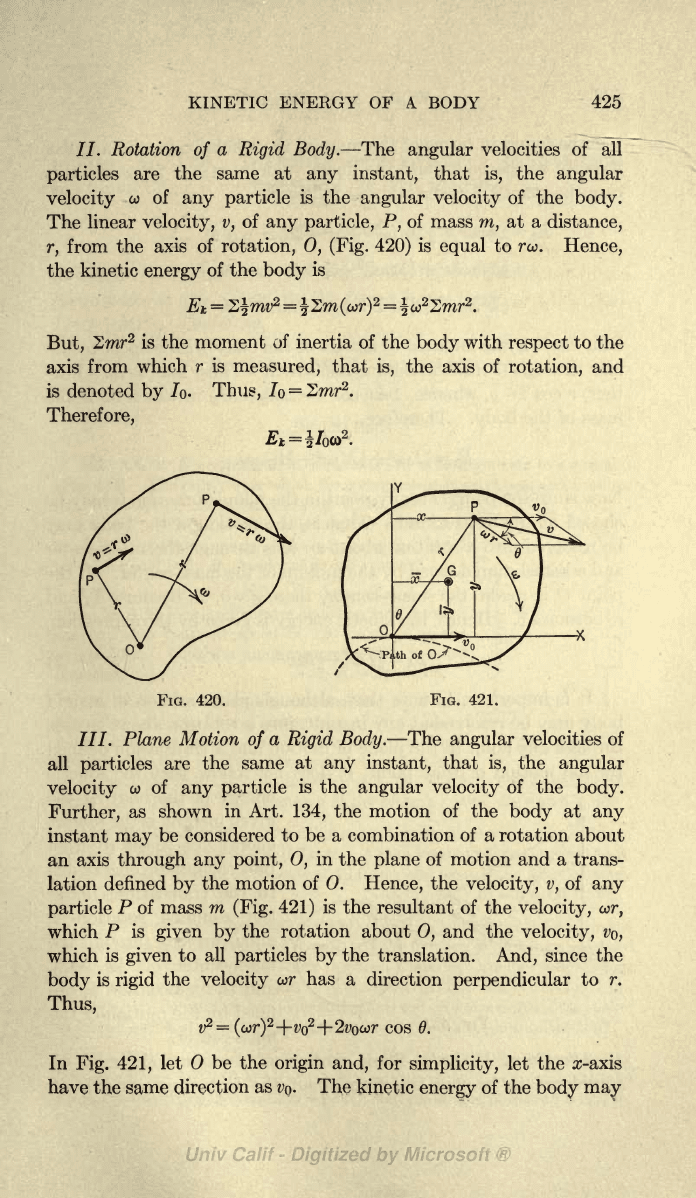
KINETIC ENERGY OF A
BODY
425
II.
Rotation
of
a
Rigid
Body.
The
angular
velocities of all
particles
are the
same at
any
instant,
that
is,
the
angular
velocity
co of
any particle
is the
angular velocity
of the
body.
The
linear
velocity,
v,
of
any particle, P,
of mass
m,
at a
distance,
r,
from the
axis
of
rotation, 0,
(Fig.
420)
is
equal
to rco.
Hence,
the kinetic
energy
of
the
body
is
=
|Zra(cor)
2
=
But,
Smr
2
is
the
moment
of
inertia of the
body
with
respect
to the
axis
from which
r is
measured,
that
is,
the axis of
rotation,
and
is
denoted
by
7
.
Thus,
7
=
2mr
2
.
Therefore,
FIG.
420.
FIG. 421.
777.
Plane Motion
of
a
Rigid
Body.
The
angular
velocities of
all
particles
are
the same
at
any instant,
that
is,
the
angular
velocity
co of
any
particle
is the
angular velocity
of the
body.
Further,
as
shown
in Art.
134,
the
motion of the
body
at
any
instant
may
be considered to be
a
combination
of a
rotation about
an
axis
through any point,
0,
in
the
plane
of
motion
and a trans-
lation
defined
by
the
motion of 0.
Hence,
the
velocity,
v,
of
any
particle
P
of
mass
m
(Fig.
421)
is
the resultant of
the
velocity,
cor,
which
P
is
given
by
the rotation about
0,
and the
velocity,
VQ,
which
is
given
to
all
particles by
the
translation.
And,
since
the
body
is
rigid
the
velocity
cor
has a
direction
perpendicular
to
r.
Thus,
cos 6.
In
Fig.
421,
let
be the
origin
and,
for
simplicity,
let
the re-axis
have
the
same
direction
as
VQ.
The
kinetic
energy
of the
body
may
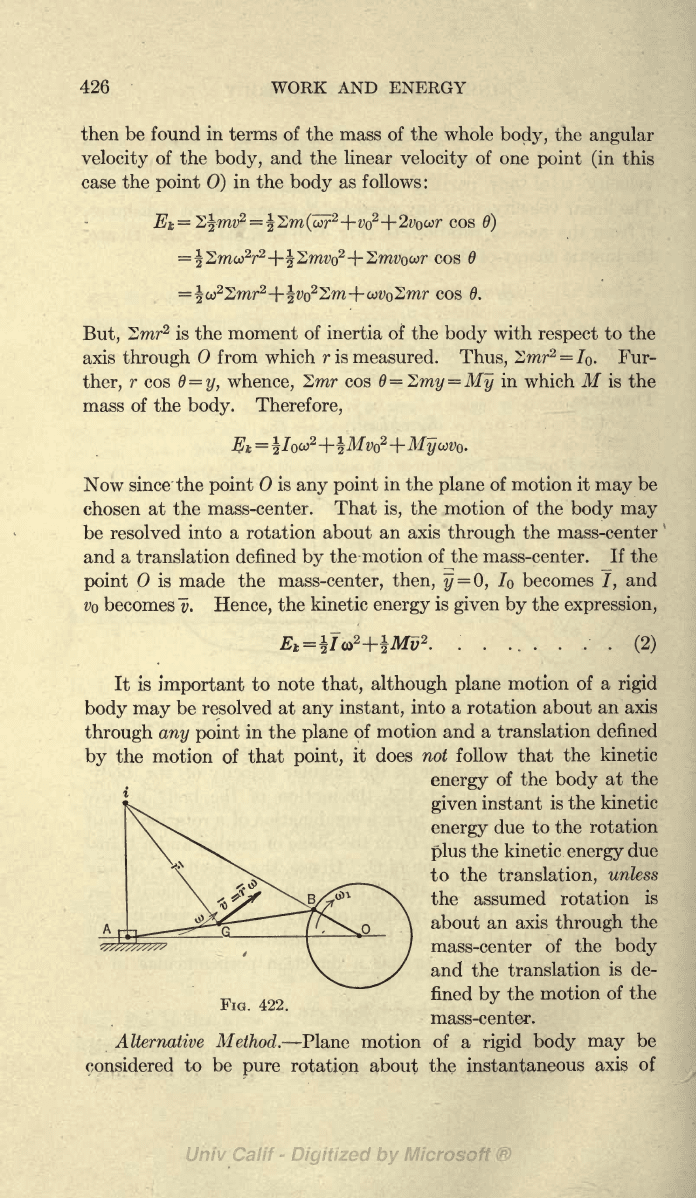
426 WORK AND
ENERGY
then be found
in
terms of the mass
of the whole
body,
the
angular
velocity
of
the
body,
and
the
linear
velocity
of
one
point
(in
this
case the
point 0)
in
the
body
as follows:
cos
0)
cos 6
cos #
But,
Smr
2
is the
moment of inertia of the
body
with
respect
to
the
axis
through
from which
r is
measured.
Thus,
Smr
2
=
/Q.
Fur-
ther,
r
cos
6
=
y, whence,
Smr cos
6
=
2my
=
My
in
which
M
is the
mass of the
body.
Therefore,
E
t
=
Now
since
the
point
is
any point
in
the
plane
of motion
it
may
be
chosen
at the
mass-center. That
is,
the motion of the
body may
be resolved
into a
rotation about an axis
through
the mass-center
and a translation defined
by
the motion of the mass-center. If
the
point
is made
the
mass-center, then,
y
=
Q,
/o
becomes
/,
and
VQ
becomes
D.
Hence,
the
kinetic
energy
is
given by
the
expression,
. .
...
...
(2)
It is
important
to
note
that, although plane
motion
of a
rigid
body may
be resolved
at
any
instant,
into a rotation
about an
axis
through any point
in
the
plane
of
motion and a translation
defined
by
the motion
of
that
point,
it
does
not
follow
that
the kinetic
energy
of the
body
at
the
given
instant
is the
kinetic
energy
due to the
rotation
plus
the
kinetic
energy
due
to the
translation,
unless
the
assumed rotation
is
about
an axis
through
the
mass-center
of
the
body
and the translation
is de-
F
fined
by
the
motion
of
the
mass-center.
Alternative Method.
Plane motion
of a
rigid
body
may
be
considered
to be
pure
rotation about
the
instantaneous
axis
of
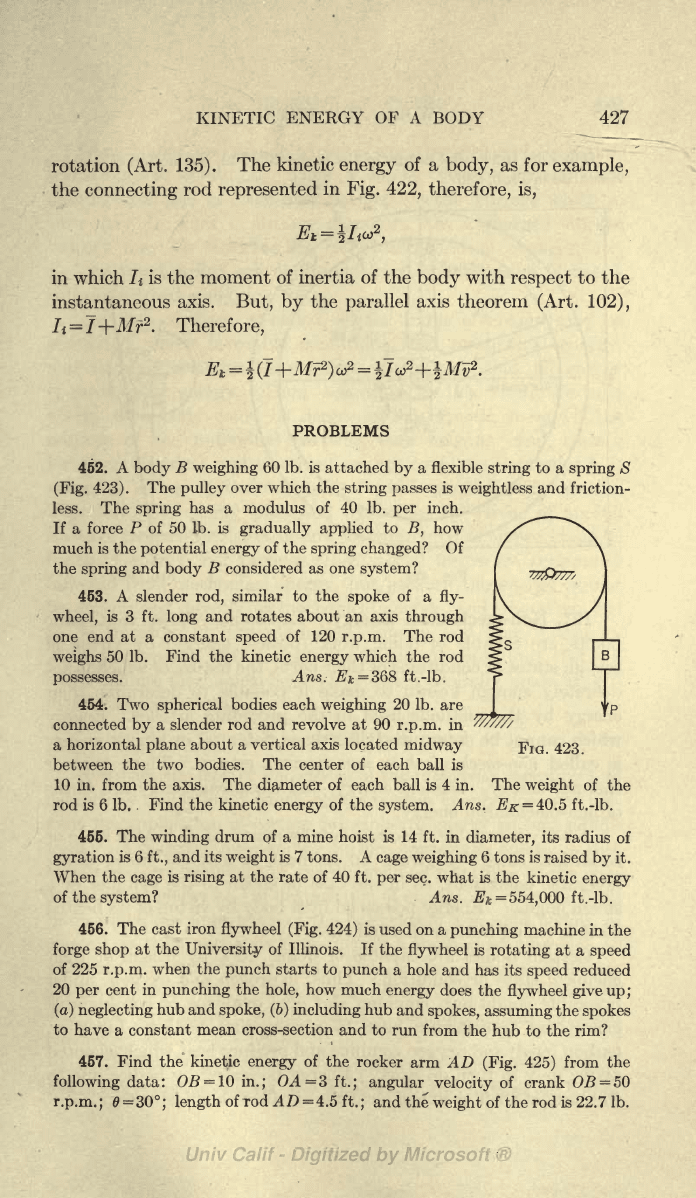
KINETIC
ENERGY
OF A
BODY
427
rotation
(Art.
135).
The kinetic
energy
of a
body,
as
for
example,
the
connecting
rod
represented
in
Fig. 422,
therefore,
is,
in
which
/*
is the moment
of inertia
of
the
body
with
respect
to the
instantaneous
axis.
But,
by
the
parallel
axis
theorem
(Art.
102),
Therefore,
PROBLEMS
452. A
body
B
weighing
60 Ib.
is
attached
by
a flexible
string
to a
spring
S
(Fig.
423).
The
pulley
over which
the
string
passes
is
weightless
and
friction-
less.
The
spring
has a modulus of 40 Ib.
per
inch.
If
a force
P
of
50 Ib. is
gradually applied
to
5,
how
much is the
potential energy
of the
spring changed?
Of
the
spring
and
body
B
considered
as one
system?
453. A slender
rod,
similar to the
spoke
of
a
fly-
wheel,
is
3
ft.
long
and rotates about an axis
through
one
end
at a constant
speed
of 120
r.p.m.
The rod
weighs
50
Ib.
Find
the kinetic
energy
which
the rod
possesses.
Ans.
E
k
=
3Q8 ft.-lb.
454. Two
spherical
bodies each
weighing
20
Ib. are
connected
by
a slender rod and revolve at 90
r.p.m.
in
a
horizontal
plane
about a vertical axis located
midway
jr
IG
423.
between the two
bodies. The center of
each ball
is
10
in.
from the axis. The
diameter
of
each ball is
4
in.
The
weight
of
the
rod is
6
Ib,
Find
the kinetic
energy
of the
system.
Ans.
^
=
40.5
ft.-lb.
455. The
winding
drum of a mine hoist
is
14
ft. in
diameter,
its radius
of
gyration
is 6
ft.,
and its
weight
is 7
tons. A
cage
weighing
6
tons
is raised
by
it.
When
the
cage
is
rising
at the
rate
of 40
ft.
per
sec. what is the
kinetic
energy
of the
system?
Ans.
#
fc
=
554,
000
ft.-lb.
456. The cast
iron
flywheel (Fig.
424)
is used
on a
punching
machine in
the
forge
shop
at
the
University
of
Illinois. If
the
flywheel
is
rotating
at a
speed
of 225
r.p.m.
when
the
punch
starts to
punch
a hole
and
has its
speed
reduced
20
per
cent
in
punching
the
hole,
how
much
energy
does the
flywheel
give up;
(a)
neglecting
hub and
spoke,
(6)
including
hub
and
spokes,
assuming
the
spokes
to
have a constant
mean cross-section
and to
run
from
the hub
to
the rim?
457.
Find the
kinetic
energy
of
the
rocker
arm AD
(Fig.
425)
from the
following
data:
OB
=
10
in.;
OA=3ft.;
angular
velocity
of crank
OB
=
50
r.p.m.;
=
30;
length
of
rod AD
=
4.5
ft.;
and
the
weight
of the
rod is 22.7
Ib.
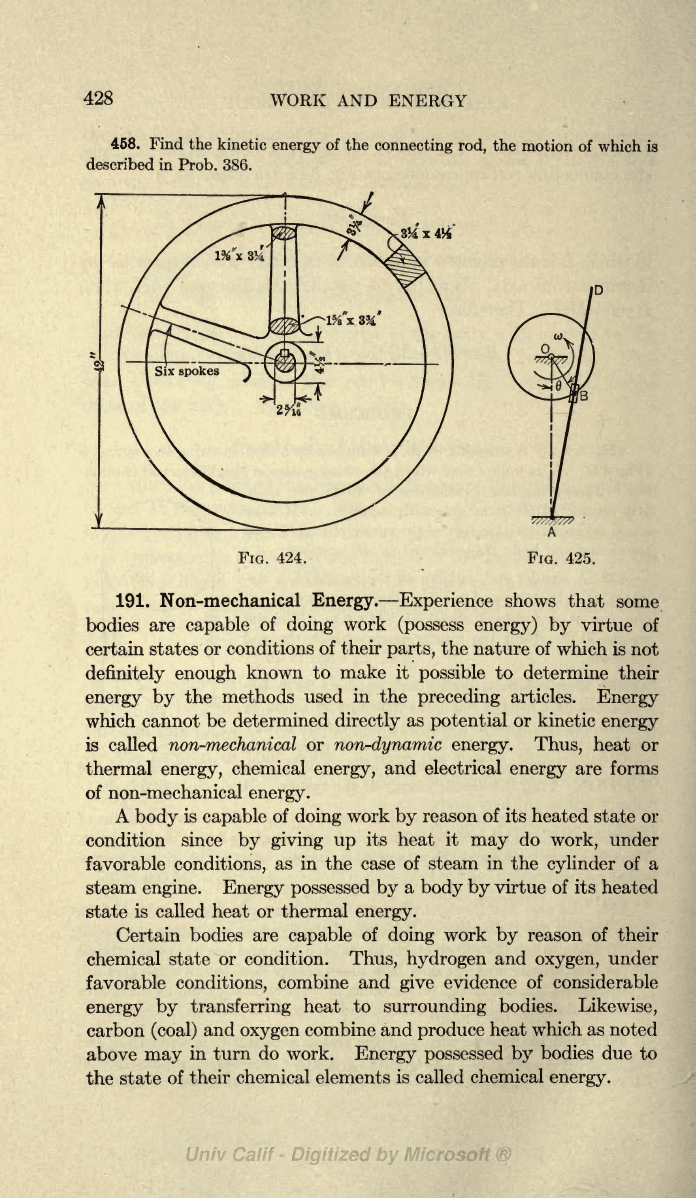
428
WORK
AND
ENERGY
468.
Find
the
kinetic
energy
of
the
connecting
rod,
the
motion of
which is
described in
Prob.
386.
FIG.
424.
191.
Non-mechanical
Energy.
Experience
shows
that
some
bodies
are
capable
of
doing
work
(possess
energy) by
virtue
of
certain
states or
conditions
of their
parts,
the
nature
of
which is
not
definitely
enough
known
to make it
possible
to
determine their
energy
by
the
methods
used in the
preceding
articles.
Energy
which
cannot be determined
directly
as
potential
or kinetic
energy
is called
non-mechanical or
non-dynamic energy. Thus,
heat or
thermal
energy,
chemical
energy,
and electrical
energy
are forms
of non-mechanical
energy.
A
body
is
capable
of
doing
work
by
reason of its
heated state or
condition
since
by giving up
its heat it
may
do
work,
under
favorable
conditions,
as
in
the
case of
steam
in
the
cylinder
of a
steam
engine.
Energy possessed
by
a
body by
virtue of its
heated
state
is called heat or
thermal
energy.
Certain
bodies are
capable
of
doing
work
by
reason of their
chemical
state
or condition.
Thus, hydrogen
and
oxygen,
under
favorable
conditions,
combine
and
give
evidence of considerable
energy
by
transferring
heat to
surrounding
bodies.
Likewise,
carbon
(coal)
and
oxygen
combine and
produce
heat which
as
noted
above
may
in
turn
do work.
Energy possessed
by
bodies
due
to
the
state
of
their chemical elements
is called
chemical
energy.
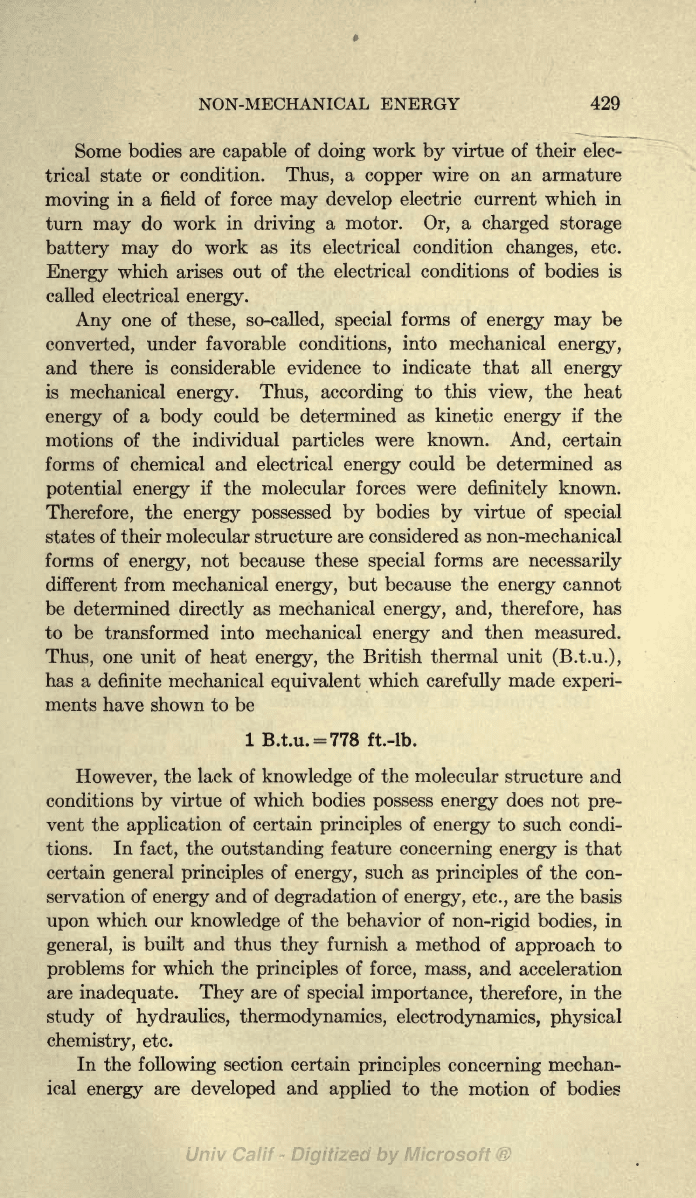
NON-MECHANICAL
ENERGY
429
Some bodies
are
capable
of
doing
work
by
virtue of their elec-
trical state
or condition.
Thus,
a
copper
wire
on an
armature
moving
in
a
field of force
may
develop
electric current which
in
turn
may
do
work
in
driving
a motor.
Or,
a
charged storage
battery may
do
work
as its electrical
condition
changes,
etc.
Energy
which arises
out of
the electrical
conditions of
bodies
is
called electrical
energy.
Any
one
of
these,
so-called,
special
forms of
energy may
be
converted,
under
favorable
conditions,
into mechanical
energy,
and
there
is considerable
evidence to indicate that
all
energy
is mechanical
energy.
Thus,
according
to
this
view,
the
heat
energy
of a
body
could be determined
as kinetic
energy
if
the
motions of the individual
particles
were known.
And,
certain
forms of chemical and electrical
energy
could be determined as
potential
energy
if
the
molecular forces were
definitely
known.
Therefore,
the
energy
possessed
by
bodies
by
virtue of
special
states of their molecular structure
are
considered as
non-mechanical
forms of
energy,
not
because
these
special
forms are
necessarily
different from mechanical
energy,
but
because the
energy
cannot
be
determined
directly
as mechanical
energy, and, therefore,
has
to
be transformed
into
mechanical
energy
and then measured.
Thus,
one
unit of heat
energy,
the British thermal
unit
(B.t.u.),
has a
definite mechanical
equivalent
which
carefully
made
experi-
ments
have shown
to be
1
B.t.u.
=
778 ft.-lb.
However,
the lack of
knowledge
of the molecular
structure
and
conditions
by
virtue
of
which bodies
possess
energy
does
not
pre-
vent
the
application
of certain
principles
of
energy
to
such
condi-
tions.
In
fact,
the
outstanding
feature
concerning energy
is
that
certain
general principles
of
energy,
such as
principles
of the
con-
servation
of
energy
and of
degradation
of
energy,
etc.,
are the
basis
upon
which
our
knowledge
of
the behavior of
non-rigid bodies,
in
general,
is built
and thus
they
furnish
a
method of
approach
to
problems
for which the
principles
of
force,
mass,
and
acceleration
are
inadequate.
They
are of
special
importance,
therefore,
in
the
study
of
hydraulics, thermodynamics,
electrodynamics, physical
chemistry,
etc.
In
the
following
section certain
principles
concerning
mechan-
ical
energy
are
developed
and
applied
to
the
motion
of bodies
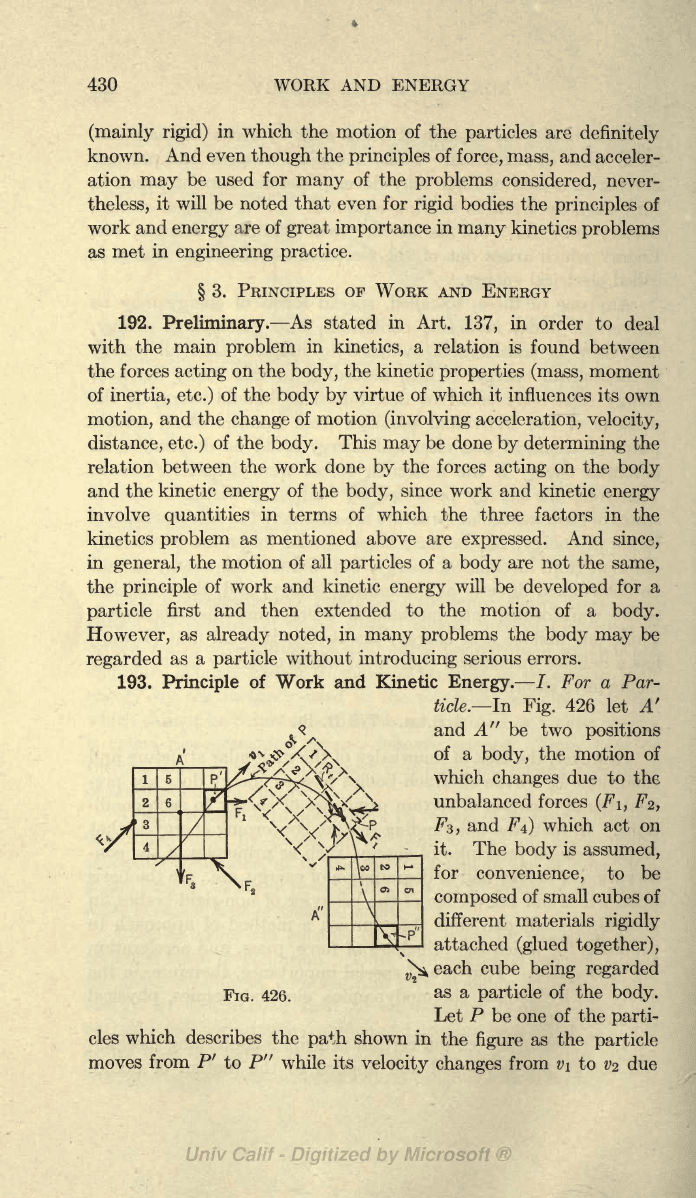
430 WORK AND
ENERGY
(mainly
rigid)
in
which
the motion of
the
particles
are
definitely
known.
And even
though
the
principles
of
force,
mass,
and
acceler-
ation
may
be used for
many
of
the
problems
considered,
never-
theless,
it will be noted that
even for
rigid
bodies
the
principles
of
work
and
energy
are of
great importance
in
many
kinetics
problems
as
met
in
engineering
practice.
3.
PRINCIPLES
OF
WORK AND
ENERGY
192.
Preliminary.
As
stated
in
Art.
137,
in
order to
deal
with
the main
problem
in
kinetics,
a
relation is
found
between
the
forces
acting
on
the
body,
the kinetic
properties
(mass,
moment
of
inertia,
etc.)
of the
body by
virtue
of
which it
influences its own
motion,
and the
change
of motion
(involving
acceleration,
velocity,
distance, etc.)
of
the
body.
This
may
be done
by
determining
the
relation
between the work done
by
the forces
acting
on the
body
and the
kinetic
energy
of the
body,
since work and
kinetic
energy
involve
quantities
in
terms of which the three
factors
in
the
kinetics
problem
as mentioned above are
expressed.
And
since,
in
general,
the motion of all
particles
of
a
body
are
not the
same,
the
principle
of
work
and kinetic
energy
will be
developed
for a
particle
first and then
extended
to the motion of
a
body.
However,
as
already noted,
in
many problems
the
body
may
be
regarded
as a
particle
without
introducing
serious
errors.
193.
Principle
of
Work and
Kinetic
Energy.
/.
For a
Par-
tide.
In
Fig.
426 let A'
and
A"
be two
positions
of
a
body,
the
motion of
which
changes
due to the
unbalanced
forces
(Fi, F%,
FS,
and
F)
which
act on
it. The
body
is
assumed,
for
convenience,
to be
composed
of
small
cubes of
different materials
rigidly
attached
(glued together),
each cube
being regarded
FIG. 426.
as a
particle
of the
body.
Let
P
be
one
of the
parti-
cles
which describes
the
path
shown
in
the
figure
as the
particle
moves
from
P'
to
P"
while
its
velocity
changes
from
v\
to v
2
due
